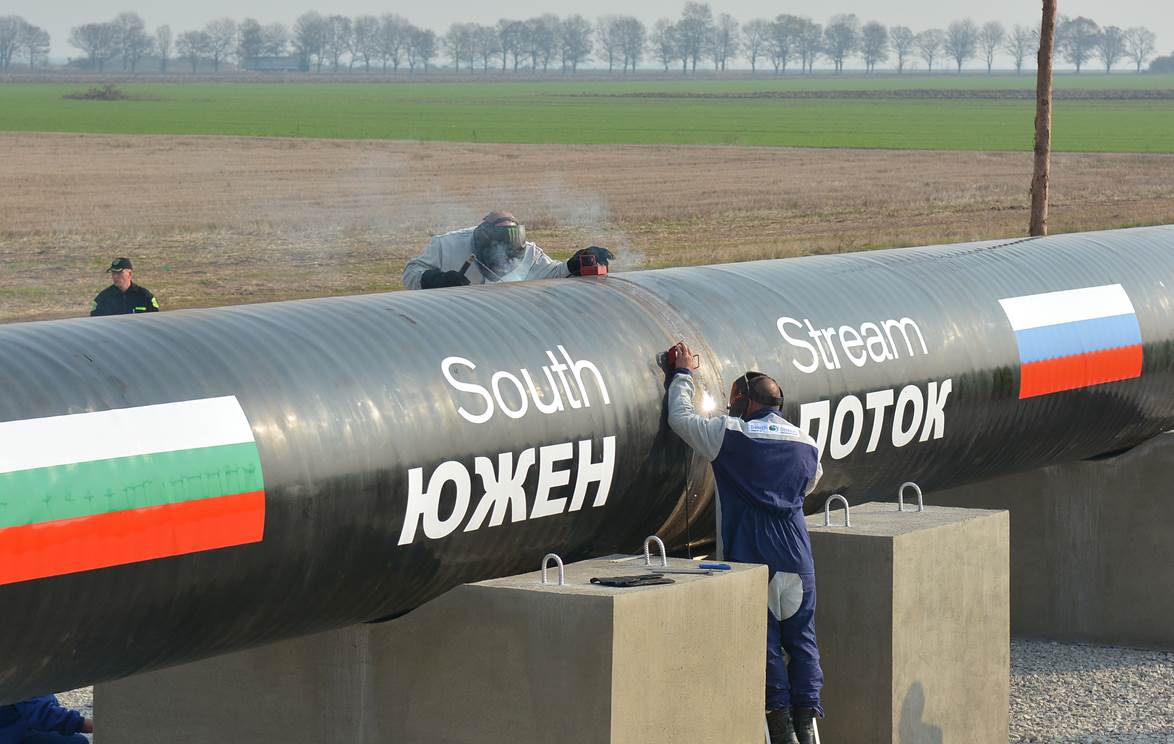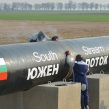
South Stream’s Demise Shakes up Italian-Russian Relations
Publication: Eurasia Daily Monitor Volume: 11 Issue: 218
By:

The “Putinian Pax Energetica”—Russia’s strategic use of energy exports and pipeline politics to influence countries in its neighborhood—is faltering, and Italy now appears to be taking countermeasures to deal with it. On December 1, during a state visit to Turkey, Russian President Vladimir Putin finally sentenced to death his proposed South Stream natural gas pipeline. This Russian-led mammoth energy initiative had languished for years as a virtual project (see EDM, September 30, 2009; July 27, 2012; July 17, 2014), and more recently Italy has played its part in burying it. This development can be taken as an indication that Rome is trying to recalibrate its relations with Moscow. Evidently, Rome hopes to strike a balance between the decade-long Italian policy of appeasing its largest energy supplier, and its obligations as a European Union member state that must implement sanctions against Russia for its intervention in Ukraine.
The South Stream gas project was estimated most recently at about $50 billion and was to connect Russia with Bulgaria by circumventing Ukraine along a route on the Black Sea floor, and then proceeding further westward on European territory. Italy’s state-owned energy producer ENI had a 20-percent share in the venture, which was spearheaded by the Russian state-run natural gas monopoly Gazprom—the remaining 30-percent stake was equally divided between France’s EDF and Germany’s BASF-Wintershall. With the pipeline’s cancellation, ENI can rely on a pair of safeguard clauses that allow it to sell its stakes to Gazprom and drop out of the project undamaged (Corriere della Sera, December 2).
ENI also has its own 43-percent controlling stake in the Italian oil and gas service company Saipem, which, in March 2014, secured a $3 billion contract to build an undersea section of South Stream. Now, to save its investment, it might invoke international trade law protection, unless part of the work it already carried out is used to construct a distinct gas pipeline to Turkey (Il Sole 24 Ore, December 4).
In November 2014, ENI CEO Claudio Descalzi remarked that the company would proceed with South Stream only if the required investment were not to exceed $742 million. At that point, Descalzi pointed out that the project was struggling to raise funds because of the international sanctions imposed on Russia over Ukraine (La Stampa, November 5).
Such a caveat attached by ENI’s boss was the product of both financial and political assessments: Italy’s incumbent Prime Minister Matteo Renzi has basically distanced himself from South Stream, in contrast to his predecessors Enrico Letta, Mario Monti and notably Silvio Berlusconi. In Renzi’s words, the project “is not key to Italy” (Ansa, December 2).
In its bid to diversify oil and gas sources, so as to ease its dependence on Russia’s energy exports, Italy is increasingly looking to the development of the Southern Gas Corridor (SGC), which will link gas fields in Azerbaijan to the Italian/Adriatic region via Georgia, Turkey, Greece and Albania. The SGC is expected to connect three separate conduits: the existing South Caucasus Pipeline (SCP) and the planned Trans-Anatolia Natural Gas Pipeline (TANAP) and Trans-Adriatic Pipeline (TAP).
The consortium of nations involved in the SGC project is also keen to extend the energy corridor eastward to natural gas producer Turkmenistan through a proposed Trans-Caspian gas pipeline. Recent agreements that ENI signed with the Turkmen State Agency for the Management and Use of Hydrocarbon Resources and state-controlled energy company Turkmenneft should be seen in this perspective. ENI has obtained an extension to 2032 of the Production Sharing Agreement (PSA) governing upstream activities in the onshore Nebit Dag block, in western Turkmenistan. More importantly, the Italian energy company has gained the possibility to expand its operations to Turkmenistan’s offshore blocks in the Caspian Sea (ENI.com, November 18)
South Stream’s demise, along with ENI’s increased focus on Africa, not least on countries like Mozambique, will prompt a change in energy relations between Rome and Moscow. These new dynamics notwithstanding, it seems that Italy has not entirely scrapped its rather fanciful ambition of bridging the geopolitical gap between the Kremlin and EU. It is worth remembering that Russia is still the largest supplier of oil and gas to Italy, as it accounts approximately for 30 percent and 15 percent of Rome’s gas and oil imports, respectively (lavoce.info, March 28).
Since the Ukrainian crisis first exploded, most of Italy’s leaders contended that Western sanctions to punish Moscow for annexing the Crimean Peninsula and for supporting separatist militants in Ukraine’s southeast undermine both Russian and European economies in a “lose-lose” scenario of sorts. The solution to the Ukrainian mess, the Italian leadership asserted, depends on a political settlement that would safeguard both Ukraine’s independence and Russia’s pivotal role in the past-Soviet space. To reach this compromise, Italy’s government backs a strong process of decentralization of powers in Ukraine that would protect both the country’s territorial integrity and the peculiar identity of its Russian-speaking citizens.
Embodying this trend, first and foremost, is Rome’s reiterated position against Ukraine’s accession to the North Atlantic Treaty Organization (NATO), as reaffirmed by the new Italian Minister of Foreign Affairs Paolo Gentiloni in mid-November. This stance aligns Italy with France and Germany in opposition to some EU member states beyond the old Iron Curtain, which advocate for Kyiv’s freedom to seek membership in the Alliance (Corriere della Sera, November 15).
According to Romano Prodi, who was both Italian prime minister and European Commission chief in the past, Ukraine cannot be neither Russian nor European. It will have to remain a neutral country straddling Brussels’ and Moscow’s spheres of influence and work as a bridge between these two Eurasian heavyweights. Back in 2008, in his position as Italy’s head of government, Prodi joined with leaders from Berlin and Paris against then–US President George W. Bush’s proposal to let Ukraine enter NATO (Il Messaggero, October 19).
In the end, Italy is walking a tightrope over the current Western-Russian spat; and such a diplomatic balancing act is not new in Rome. It is the old story of Italian governments striving to find a position of equidistance in case of international crises. Italy has often pursued this approach—for instance with regard to the Israeli-Palestinian conflict—to escape its basic geopolitical irrelevance. Yet, a game-changer is fast approaching, which may finally push Italy toward a more critical posture over Russia’s growing assertiveness from the Arctic to the Black Sea: the definitive launch of a planned EU common energy policy.




